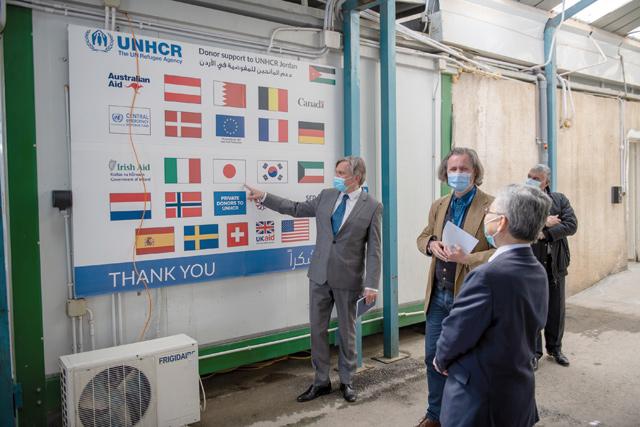- Local News
- Mon-2021-03-29 | 04:15 pm

Nayrouz News Agency :
Amid the devastating socio-economic impact of the COVID-19 pandemic and the rising vulnerability witnessed across Jordan, the Government of Japan has once again stepped forward to support refugee community centres and provide vocational training opportunities for refugees across the country.
Through a $4.875 million donation to UNHCR, the UN refugee agency, Japan’s support will enable refugees to access important community-based protection services such as counselling, mental health and psychosocial support, as well as recreational and self-development activities, according to a UNHCR statement.
Although community centres currently remain closed due to the pandemic, many activities have simply moved online, providing refugees with an important avenue through which to learn, develop and feel a part of their community while everyone remains at home.
Marking this contribution, Japan’s Ambassador to Jordan Shimazaki Kaoru, and UNHCR Representative Dominik Bartsch, gathered on Sunday to discuss how the donation will contribute to community empowerment and bring hope for hundreds of thousands of refugees, said the statement.
"Amid the COVID-19 pandemic, at UNHCR we rely more than ever on our refugee community volunteers as a voice for the challenges their communities are facing,” noted Bartsch, adding that "funding from Japan is consequently most welcome to allow us to respond more effectively to refugees’ concerns and also provide a safe space in these challenging times”.
"We appreciate the valuable role of UNHCR which is essential for vulnerable people who are severely affected by the COVID-19 pandemic in Jordan. We hope our contribution will effectively support their activities to provide various services beginning from livelihood trainings to the Syrian Refugees,” the Japanese ambassador said.
Japan renewed its commitment of support for vulnerable refugees as it has continued since the onset of Syrian crisis. In addition to supporting refugees, UNHCR’s community centres also play an important role in helping the Jordanian host community, facilitating peaceful coexistence and social cohesion between refugees and Jordanians, he added.
"A word can’t describe my gratitude,” said Ahmed Elmi, one of the volunteers in Al Nuzha community support centre.
"Working in the centre changed my life. I became more effective and reliable. Serving as a link between refugee communities and UNHCR before and during the COVID-19 pandemic, I gained self-esteem and developed self-discipline”.
In addition to this contribution, the Japan International Cooperation Agency (JICA) also donated 3,000 Non-Medical masks to be used by refugees in Azraq Camp. These masks were tailored by refugee women as part of an empowerment project, launched by JICA with partnership of Tribalogy (Stitches of Hope for Training LLC), said the statement.
As the COVID-19 pandemic continues to impact refugees and Jordanians across the country, continued support from the international community remains critical.
"After 10 years of the crisis in Syria, Japan’s revitalised solidarity with Syrian refugees is much appreciated. UNHCR Jordan express deep gratitude for the support from the Japanese people and is looking forward to continuing and strengthening collaboration with the Japanese embassy, to provide aid and protection for the most vulnerable refugees in Jordan,” concluded the statement.









